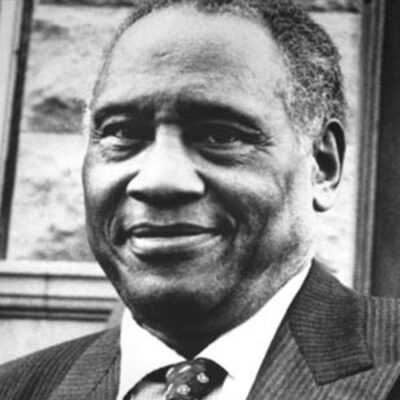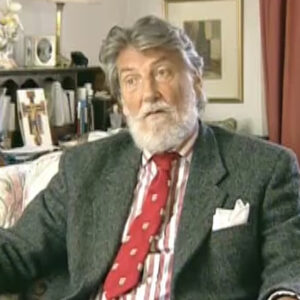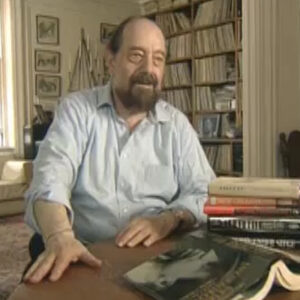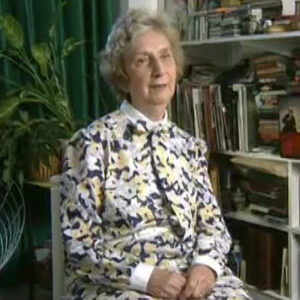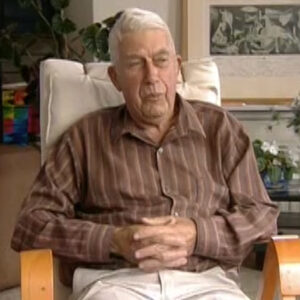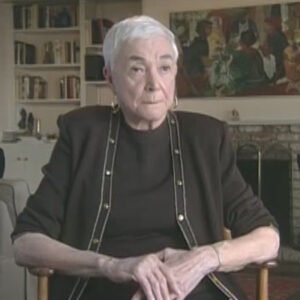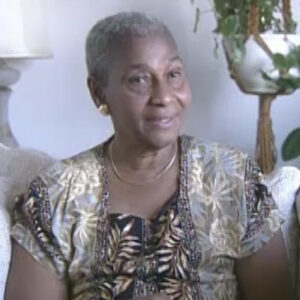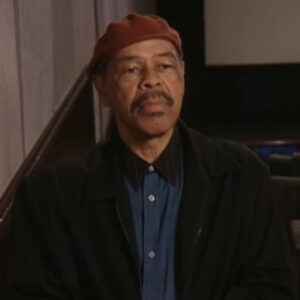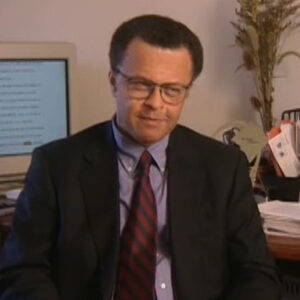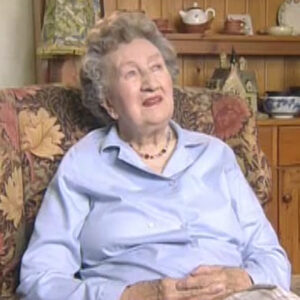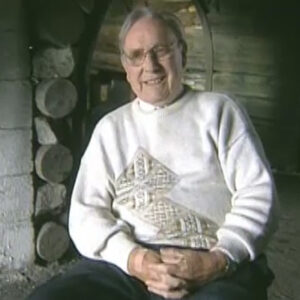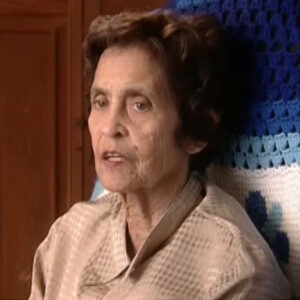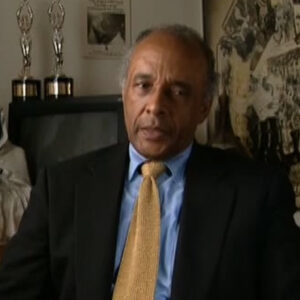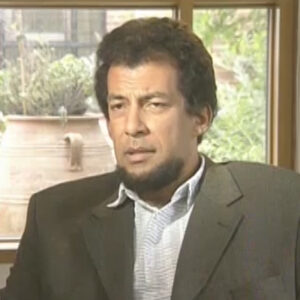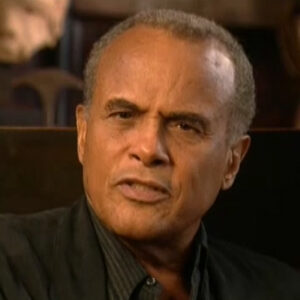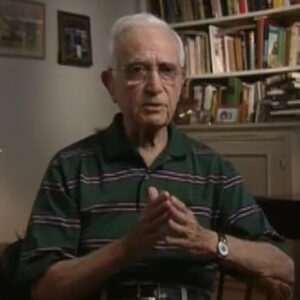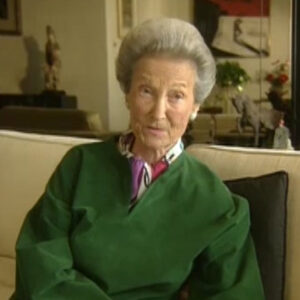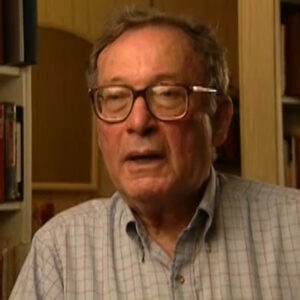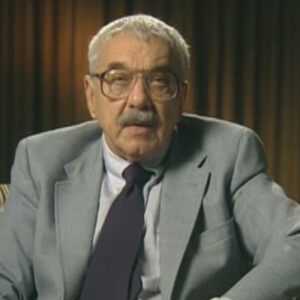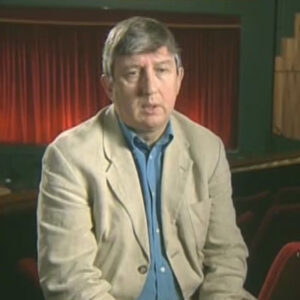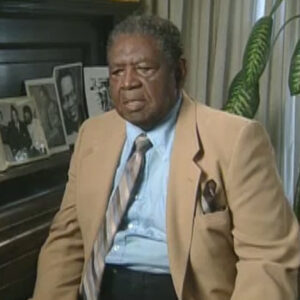Speaker No. Oh, yes, before I knew Paul Robeson as an activist and as a fighter, that he was I was a member of the Communist Party. I joined the Communist Party back in nineteen forty six. I just came out of World War Two. I was the United States Navy of the South Pacific and I was being discharged. And when I came out, I went to live with my mother who lived in Newark. And at that time I went into the factories and that’s where I met people who were communists who would tell me about about the trade union movement, about politics. And more than anything else, I tell you, it left a big impression on me. Even today, they told me about my own history.
Speaker Who I was. Where I came from, like. A popular rodenas. I don’t usually break down this way, but that’s where I got my start in politics and I’ve never given up since. I fought, I fought because I think what I believe in is right, and I’m fighting for everyone, not just for black, everybody who’s oppressed. How did you meet?
Speaker Well, while I was in the party and actually, you know, I did everything that we and the party was doing in those days and we were involved in the peace movement. By the way, just after the war, I was involved in the Stockholm Peace Appeal. We worked on the we charge genocide with Paul. And we developed Paterson, by the way, who presented a petition to the United Nations. I was in a trade union movement.
Speaker Yeah, I was in I, I started in the factories and I was in I that’s where I began my my my climb into politics. And I wasn’t I was at that point, you know, I remember the party when I got started there, but there were communists around me. They used to guide me and they supported me to when I was running for office. And within that union and and I was able to achieve high, high elected posts in the union. And then there came a time when, you know, they were giving me things to read things about civil rights, about racism and about about Jim Crow, about everything that was that I was interested in learning. And I learned a great deal overseas, by the way, when I was, you know, when I went overseas and what we’re to and seeing what was happening there among the Japanese. And I could never forget that. Now, some people think that all Japanese, by the way, were fascist and they all ready to, you know, wanted to go to war. Well, I met Japanese soldiers who are not in that category. We used to you know, we captured the captured Japanese. I was one of their guards, by the way, are the guards that watched over them while we had them out in the roads, you know, picking up debris or fixing roads or something with whatever work detail be. And I came to know a couple of Japanese who could speak English. And and I was very impressed with some of the things you’re saying. They said, look, we didn’t want to fight either. We’re not your enemy. We we’re your friends. So I saw them differently than some of the other soldiers or Marines or these Japanese who they had come in contact with. I guess naturally I didn’t have any confrontations on my about battles with them, etc.. So but the fact of the matter is, those I did know certainly impressed me a great deal. So when I came back home, I began to talk to people about these Japanese that I had met and apparently the Japanese had met with the same type of Japanese that you see here today. You know, they they’re just like anybody else. Some of them wanted war, some didn’t. Some agree with the government. Some didn’t accept it. So that’s where I got my start in general.
Speaker Tell me the first time you heard about.
Speaker Oh, yes, well, the point is, in the end, the party naturally, all those things that Paul was doing, we would be discussing in our party clubs about about the Soviet Union, you understand what was going on in the Soviet Union. Paul was making trips to the Soviet Union. He was have received overwhelmingly by those people in the Soviet Union. And and, you know, in that sense, I was a communist and study Stalinism and Leninism and Marxism. Well, Paul was more like like a hero to me. And anything that Paul was doing certainly was great interest, not only great interest to me, but the entire club that I was involved in was very interested and concerned about the report. What Paul was saying and we listen to what Paul had was saying. Now, Paul became involved in an effort in Africa in terms of Pan Africans, and he worked with the boys, by the way. And I know the boys, too. You should know I’ve met with them a few times in meetings where, you know, during the time he was here, when he ran for the United States Senate, but for the state of New York and when he got involved with the Stockholm Peace A with all of us involved. And so that’s what I that’s what I knew about Paul Robeson.
Speaker How did you get to do?
Speaker Well, the security as far as Paul was concerned, because of the climate, a McCarthyite climate than Paul was being called the enemy of this country was he was called the a traitor. And and the ruling class of this country made it made it was no question about what they’re going to do. They’re trying to they were trying to shut them down to isolate them from the people and for the people for the rest of the world. When Paul Kinsinger here, by the way, a concert halls are being closed, closed down close to him and they wouldn’t let him appear to sing, etc.. So Paul will be singing many times to trade union halls, by the way, in his country, he would be they would invite him to sing and and different other parts, outdoor, a concert of things where the halls were not, you know, inside was not a factor, or at least it would not be a factor in denying him the right to sing, etc.. That’s what happened in Peekskill, in Peekskill, New York, just out of pity. It was a peaceful with just outside peace. Come to the town now. But anyway, that was done because of the fact he was denied the right to sing in these concert halls, etc. So the people had a right to hear them. And so that was organised for that purpose. Now, but if we recall the bodyguard back then, in those days, we would call security. When Paul came into, let’s say when I was in Newark, when Paul came to Newark, it was people like myself, young young men, you know, my age. I was about twenty in my 20s, early to a twenty one twenty two. At the time. I was called upon to be at a certain place. Paul was coming in and our job was to protect him from those people who would like to do bodily harm to him. And so not only me, but there are other veterans like me, and I should also say older people as well. But we arranged that his security, we were there to protect them from anybody who would think about taking taking his life or do bodily harm to him. What were the kind of things that were perceived as I mean, you said, well, the point is, if you back in those days, if you pick up the newspaper, you know, you saw all sorts of arguments against Paul Robeson and the names that they were calling him, it was like they were trying to create an atmosphere of fear and hate to the point that some stupid individual who might say, well, look, this guy, you know, is our enemy. And if I take him out, this would be a contribution to our country. And so we had to worry about that, be concerned about that. And they were doing that. They were doing it to us as blacks in the south lynching us. And we remember all those cases that came came up there, etc. So why not Paul Robeson now there? I’m sure that Paul received a lot of threats. We were told when he went, you know, went to different places. The phone’s been ringing what they’re going to do to him, etc.. I know the party headquarters received many phone calls, I’m told, again, of threats against Paul’s life, etc. and the party thought that we were obligated to protect and defend Paul Robeson. So that’s why I became part of that security force around the Paul to make sure that we did not have someone coming from the audience from out of nowhere to do attempt to do bodily harm.
Speaker How did.
Speaker What I was roll, yeah, speed.
Speaker It’s a question you spend a lot of time with him or at least in his company. How did he what did he think about the need? Do you think that you think about it?
Speaker Yes, I think that sure. I don’t think that that he did not pay any attention to security. It would be foolish not to be concerned about that. You know, I lived through that period, the McCarthy period. I know what these people were capable of doing out there.
Speaker The hate mongers and and those who call themselves anti-communist, like McCarthy period, was there specifically to try to frighten our people and to use whatever vengeance they could against people like myself. I went through it, you know, and so we were very concerned about that. I know what it was about. But what about Paul? Was he sure he was concerned about that? He never objected to us being there. I think he was certainly concerned about. But peaceful if even if he was concerned about the time that he met and peace and what they did there, I think he certainly became concerned after that if you didn’t. But I’m not saying I’m sure that he was very much concerned about someone doing harm to him. And that was our job to protect him. And he expected that that’s part of the his traveling around wherever he went. The party provided the security that we think thought was necessary for him to protect it for these people.
Speaker So he said stuff like, I mean, you heard him say, well, how are we?
Speaker Are we ready? Do we have a people out there? I mean, I can fix this if I’m finished. I was just, again, someone who was, you know, a part of the entourage of the people who came around him, et cetera. But those who are in leadership would certainly inform him to tell him exactly what Rudy is going to take, by the way, how he comes up on the stage, so to speak, and where to leave the stage in order to escape if had to be. All of that was part of the of the arrangements that were made in order to protect the Paul Robeson, OK.
Speaker Tell me about as much as you know about your role in Peekskill.
Speaker Well, when this whole question about the climate, again, I just talked about where he’s been denied the right to sing in these concert halls throughout the country, they were closing the doors and Paul was not allowed to sing there. And the FBI was just much involved in that because they’re the ones that sent the threats in to the owners of these concert halls and told them about Paul Robeson or what they’re going to do or some kind of threat or another that anyone going to take any chances of having Paul there. If they thought there was going to be some kind of a confrontation which would wind up hurting their particular facility, whatever it may be. And so the my role, you know, in terms of Paul Robeson and again, you know, I looked upon Paul Reubens as a great hero. After all, Paul Robeson was was a person who’s out there speaking out, talking.
Speaker He wasn’t hidden and behind some closed doors. He was outspoken. He didn’t mind speaking his mind, and he let people know how he felt even when he went before the Congress. By the way, the House un-American Activities Committee, if you see that the the real fear and the way the way you conducted it sounded to me that was I said, my God, this guy is a giant. And this is how I this is I guess and that’s what I conduct myself today. I have no fear of these people. And I didn’t have fear then. That’s why I was an open time to everybody else was frightened running away out of fear because of the communists.
Speaker Go back. Go back to the beginning.
Speaker Well, the people well, the party organizations, by the way, when they had organized, I had nothing to do with the organizing of the event itself that was going to take place, that was done elsewhere on top, et cetera. But my role was when they sent word down to the party ranks that that he would be appearing and at that place that is in Peekskill to conduct a concert there and that this was like a challenge there, by the way, to the rest of the country and to the power structure, to the FBI, that you are not going to shut him down and that we as people could range and protect him. And he will say that was actually what was going through the ranks of the Communist Party and Progressist and those who were not friends of Paul. That feeling was that we are not going to let the enemy stop him from speaking out or to sing here in his own native country. We were going to provide a space for him to do that. And so when the party got together, we had volunteers and and people were assigned to that part of the of the entourage, that is the security forces, to make sure that we got there, we would be there to protect him. And that was our job to protect him from anybody coming to the stage. No, I wasn’t frightened. You know, I was not free because during that same time, you know, I didn’t know. I want to make it clear that I didn’t suffer. And the same magnitude for poor Rosa. But I was suffering, too. You know, I was under the fire of the FBI visitations and I was part of the COINTEL program they had, et cetera. And and, you know, and the threats that made against my life, by the way, my children’s life, I understood this. I was it. I never exhibited any fear. And Paul Robeson never exhibited fear. That’s what made him so great. While others might have shirked and ran the opposite way, Paul stood his ground. He let them know, look, I have a right to sing and I have a right to believe what I want to believe and think I’m for the people. He felt he was a part of us, and that’s why Paul was so great in this country.
Speaker And so.
Speaker So tell me what happened while I was here with the rest.
Speaker Now, some of us had a lot of veterans, by the way. There were a lot of veterans who were there. And they were the veterans had I think I’m trying to it’s like American Legion, but I think ours was that I belong to Veterans for Peace. I forgot the name of our organization the long time ago, and many of us who that the show our identification with Paul, but also as Americans, as someone who fought in the war, the Great Wall of Warrior two. And we were out there to support Paul. And I was there among many of us who circled the platform on the stand and stood and watched the crowd and watched anything that might be going on that needed to be reported or taken care of, etc., but mainly to make sure whatever was taking place, they could not get to a Paul Robeson.
Speaker Did you ever hear about reports of snipers?
Speaker This is all this this is what I heard. I did not see any snipers of that kind.
Speaker There was a whole lot of yelling and a whole lot of noise there coming from these people, from those who did not like him. Many of them, I guess I would suppose I would now call racist, etc. A lot of that was going on. A lot of that was going on to that. Even the first of another two meetings up in the Prisco one was I don’t think we were prepared for what did take place on the first trip to petechial at they fear the forces that turned out in droves, the the local people. And and I guess they would they could have been busted all over the place and all the stop Paul Robeson from performing at that particular center. Now, it got to the point where a decision had to be made then, and that’s when they they withdrew. And Paul went back to with security around him into a car and he was able to move out of the area now, came back and came back to the party.
Speaker We had discussed it again. Should we allow them to have this victory? Should we allow them to have their way on this? The fact that Paul Robeson was not allowed to sing, where are we going to let them have their way? No, and that’s why it was organized again this time. We were going to be prepared. This time we’re going to be prepared with numbers and everything that took place that we need in order to guarantee him the right to sing. Because the important thing was the fact that he would be allowed to sing and that no one was going to stop him. No, no, no. I was not armed. No, none of us armed that I know of. No, I cannot say quite so. No arms did we carry because, you know, that would be something that the ruling class would have loved to see happen. And they can go in there and see that this guy had a gun and that guy had a gun and it would have been a mess. No, none of us were armed that I know of. I know I was not armed.
Speaker Were there any physical confrontations between security and the police?
Speaker Now, I tell you when now will you talk about the first time? The second time. OK, all right. The second the second time the you know, they they did not come within the circle. They stood outside and actually and they start there was also the name calling traitor, go back to Russia. All sorts of things with that kind of being was being thrown out there among the group, but etc.. But but they never got close to the security, by the way. Never came in with a bunch of cowards such as that. They could act one way when they thought they had it, overwhelmed that, etc.. But when I second go round, you did not see that happen.
Speaker But something did happen, though. After the concert is over, that’s when most of the things took place. Everything took place, everything broke loose then, etc..
Speaker Well, our job again was to get out of there. You are part of this thing, understand?
Speaker I don’t know if my memory is failing me. There was any interruption that was such that would stop that stopped them from singing. He was allowed to sing. He did sing and he got enough people out there to guarantee the fact that he had a right to do so and to protect them and is respected.
Speaker And so Paul did sing. Now, when that was over and the security, you know, had him moved away from the from his place, that is from the platform onto his plate on the car that would take him away, etc.. I think it was a car to take him away out of there. Now it’s when the people are breaking up.
Speaker It’s going the wrong way. Buses taking bus that came in from New York and different parts of carloads of people coming in. It’s when that was taking place. Then the crowds begin to respond. Rocks were being thrown, windows being broken. Even cars were being turned over on on the way out from the from the from that place where you had just sung, etc.. And the police stood by and did nothing. They saw what was happening and what I observed. They did nothing. Sit back and watch the tape as if they were on orders from some higher ups. If anything take place, just maintain your cool. Don’t say nothing, don’t act or do nothing except knowing what the result was going to be, etc..
Speaker And so that’s that was the the major confrontation. And that’s something that people will never forget. I know how fast I’ve known it for many years, how it fares wrote a book on that called Pisco USA. And now I wonder if I can say something here, because I mentioned Paul Robeson and the same way, you know, when I talk about the Communist Party now, there’s some discussion about being a communist. Now, I don’t know Paul Robeson myself as being a communist. And I served on the highest bodies of the kind party USA. I was a member of the Central Committee of the Communist Party USA, and I met many leaders from throughout the world, the communist world and socialist world, you want to call it. And they would come here and I would meet with them, talk to them, etc.. I spoke throughout this country on behalf of the party. I ran for public office on a pay after party within the party line. By the way, I ran for United States Senate on the committee with gasohol, et cetera. But at no time that I know or have heard that Paul Robeson was a member of Communist Party. But I do know this, though, that Gus Hall did speak with Paul Robeson, did meet with him on several occasions, and he would report back to us, the central committee of the meeting and what took place and what happened.
Speaker Did you, uh, did you attend the Golden Gate Forum meetings? Were you aware about that?
Speaker If you don’t know, I don’t know. OK, um.
Speaker I’ll tell you, you’ve given us a short time. One other thing I wanted to ask you, though, when you, uh, earlier.
Speaker The struggle as a young black.
Speaker Was there any that some of your friends who were black today like? Question you or criticize you for joining basically what was called the white left.
Speaker Well, I don’t know, we called it those days, the white left, it was a it was the communist or the Communist Party and those days and there were few of us blacks, by the way, involved in the campaign, particularly from Rockland County. I was known as the number one communists of this county. I was looked upon by FBI, by Edgar Hoover as a as a number one person that he thought was necessary to to harass, to investigate whatever I was being followed by them.
Speaker I was appalled that COINTEL program.
Speaker And I would say that my first marriage broke up because of what they did. They I was a victim of their of their harassing tactics, etc. And when I went on and pulled from job to job, but I got hired at work, they would move in and I would be fired. But let me tell you, with all of that, that they did they could not break me. They could not break me. And what they wanted to know from Bill Scott was, who are these communists who are not known as communists? Then I know this, but they suspect that they might be that you know this one. Did you know that one? And I know a whole lot of them. And I want you to know that from Hollywood, they and I used to live not far from here, by the way. I used to meet in their homes, etc. Many of them you heard about on sick. Some of them some of them are gone now. But I know all of them. They knew I knew all of them. And and I would not cooperate. I would not reveal the names, even the other. His case, by the way, there are a whole lot of things about that that I knew and I never, never reveal to them about what I did know when they came to my house. They used to come in pairs to to again to threaten me. I guess I say, look, aren’t you going to cooperate, the United States government, etc.. And I said, cooperate. What did you go to? And by the way, you remember Emmett Till that was killed in Florida? Well, I would say what did you do anything about Emmett Till that was beat that had just been killed, the Florida who shot down the Mississippi, etc.? And what about Harry Moore and his wife had been bombed?
Speaker I mean, the thing about Paul was.
Speaker But Paul was involved in all of that. Now, Paul was involved in all that talk about now he was involved in that. He had made speeches on that, etc..
Speaker You I well, tell me the first time you actually saw him. Well, first time, if ever.
Speaker Oh, my God. We would have meetings, by the way, that Paul would attend. And certainly on many of those issues of the day, let’s take the the question of the Stockholm Peace Appeal, etc. We organize a big petition campaign in this country to in order to I’m trying to get the exact wording of it, but was to band up, I think the atomic bombs or whatever may be the boys was involved in that as well. And what was it we did? Patterson, by the way, was involved in that. I can name a whole lot of other people involved.
Speaker And so I would set it meeting. But I’m young.
Speaker I’m not. I could boast about boy, I said, hello, Paul. How are you doing now? I’m young and I’m looking at someone that you know, who is looked upon throughout the world as a great man, etc..
Speaker And here I am sitting there in the same room with him, listening to his views on various topics or issues that were on the agenda, etc. when and I would participate in those type of discussions, we were the UN security. Naturally, he would come in, we first thing to do, he would come up to us and and shake hands, how are you doing? Blah, blah. And before he would perform. So that’s, you know, that’s how I knew him. You know, that was not just from a distance of some one who was involved in the same type of cases were issues that I were involved in. And I was a part of those meetings with him, the one with the boys and people like him.
Speaker Based on your experiences with him and in the party.
Speaker Tell me how that has affected you, give me a feeling.
Speaker Yeah, well, it certainly has affected me. The life of Paul Robeson has been a major factor in my own life and turned what he stood for, the things that he fought for the party. Even though I’m not a member of the party now, the party I must give credit in terms of developing, developing me, educating me in terms of what who I am and what I did and what the achievements I made in life. I have to give the party credit for that and for the party.
Speaker I’m proud of the party and its members. They they tried to groom me. And in terms of how to speak, I became, you know, I became a good speaker and now I would use as a speaker, you know, with great power or any other kind of they would call upon me to speak at some of their other affairs.
Speaker But the party was when they created and the party helped to create me who I am today. Now I have to destroy the party now. And, you know, but that doesn’t take away what they did earlier. Paul Robeson was someone I looked up to for a role to show no fear of what he believed.
Speaker He could have hidden his views or he could have me so well, I want to get involved that I, like a lot of other artists, did and lived a good life. Here’s a man who stood up and fought and even a great sacrifice of a profession that he had a great singer and artist, etc. and yet he fought back and never gave up. Well, this is the same thing with me today. I feel the same way when I talk on my television show and I talk to people. I’m not no fear because I believe in what I what I’m doing. I believe that I have a right to believe it and I’m right and doing it now. Some people and not like the way I say it or how I put put it forth.
Speaker But let me tell you something that I know what they did to me and I’ll never forget that.
Speaker And I know what some of the I going to use the word I use on my show, some of those Negroes, they also played a part in this and this fight against people like me and Bill Scott, et cetera, and they report it to the FBI, gave my name and told them what I was doing, who was associating with and I don’t forget, that is some of them are still living. And I say that on my show and I don’t mind saying I’m talking about because it did affect my life and I will never forget that. Now, Paul Robeson, how can I forget it? Paul Robeson. And let me tell you. And now these same black leaders who were as much against Paul Robeson as Agema McCarthy and the other House un-American activities, people Kennedy included Bobby Kennedy. He was he was involved in one way or another. But the fact is, all of a sudden they come out and say, who the great Paul Robeson? And he did this and we got to honor him. Well, better late than never. But you know what’s bringing about a new situation with Paul Robeson? The young blacks today are now looking at this issue and looking at what happened doing that. And now they can analyze for themselves who are the real heroes then?
Speaker Who are the people that really led the struggle? Well, those who who worked with the FBI and with the power structure or those who work along with Paul Robeson like those.
Speaker Scott, the NAACP was pro United States government in every aspect that had any negative things to say about Paul Robeson, had anything to say about Paul Robeson, NAACP, join with them the enemies of Paul Robert. They were on their side.
Speaker They weren’t on the side of Paul Robeson. I can tell you that I was a communist at the time. I organized a branch of the NAACP here in Spring Valley, New York. But I’m the founder of the branch and I’m telling you what. And in the Constitution, they have to if you’re a member of the of party, you can even be a member of the NAACP. But I was a member for I understand how I was allowed to be, but I was a member of the NAACP. They never played a role and support of people like Paul Robeson like that. Even to Dr. King, by the way, when King took that position of the Vietnam War, what was the Roy Wilkins view that go back to actively try to do that?
Speaker Right. There were part of my in my opinion, my opinion, they worked along with the FBI.
Speaker They they worked with a guy who was a feeling and look, we have a great big organization that’s a black one that agrees with us. And they, too, are against Paul Robeson. They were against Paul Robeson because he was not American. Enough understand to them he was un-American. As far as Roy Wilkins was concerned. Walter White, I don’t know if you remember, I heard of Walter White. He, too, played a role in that respect. The NTSB has always been on the opposite side of the fence when it came to causes like like what Paul fought on, etc.. Why?
Speaker A lot of people were for the NAACP, right? Yes.
Speaker Why do you think that they were able.
Speaker Well, you’ve got to understand the period. Yeah, a lot of blacks, by the way, didn’t understand this whole thing, the struggle between the Soviet Union and the philosophy between the Soviet Union and the United States. They listen to the propaganda coming from outside the radio, TV and writings, etc. and they were the enemies. They’re out there. You know, if you if you sounded like, by the way, you were sympathetic, you would pay a price for that. I paid a price. I lost many jobs because they intervened because in fact, what I believed and what I thought, et cetera, and blacks could not afford to be put in that position, many of them. Now, by the way, you should know that blacks knew where I was coming from, those blacks who knew me.
Speaker We used to sing songs like The Italians, a part of the song of Vontae Popolo, Alah Resource, Bundarra, Nelson Mandela, Rosa.
Speaker We used to sing that and they used to laugh about that. Now, with an Italian Communist Party song and other things, they just so that the members here in Robin can imitate. Most people in Rockland County knew exactly where I was. In fact, even as a Congress, I was a member of the First Baptist Church, by the way, one of the leading members of the church there. And we took a position against the Korean War and the FBI came in, moved, and they thought I was involved in it. They knew exactly what was happening.
Speaker We knew that.
Speaker But because because they believe the hogwash coming from the from the power structure, the white power structure in this country, the fascist, the right wing of this country who are attempting to to destroy and destroy anything that black why they to do the same time, you understand, brother. And at the same time you had you have what you call a Jim Crow in the south, blacks at the same time that Paul Robeson was fighting, by the way, they were lynching blacks in the South, they were persecuting blacks in the south. But that would mean that the blacks liked the idea. But this is the way this country had our people and encouraged them and did what they could do, what they did because they had the power to do so. And we suffered because of that. But Paul Robeson, open the door them. Paul Robeson, open the door for even what we have today, by the way, to speak out Paul Robeson, open the door and set an example. A lot of them didn’t quite understand it then. And many of them probably said, boy, we should have said that. I wish I was more involved. And they can’t say that they envy me because I’m saying the same thing I’m saying to you today. I said way back then. And so when you ask me about Paul Robeson, I can identify. So when I get these other black leaders talk, and particularly if they have not changed their views in terms of what we’re all about, I don’t mind criticizing them in the same boat. They’re the same enemy. I don’t care what color skin they are, they’re still our enemy. If they speak and speak and align themselves with our enemies, that comes out of Washington.
Speaker Paul Robeson was fighting racism. Yes, and he was fighting racism, so. Wait, wait. The NAACP had a lot of support from these black people.
Speaker Why didn’t. Delete the membership of the NAACP, stop the leadership.
Speaker It just didn’t happen, going to say it didn’t happen because either they didn’t know how to do it, you know, let me tell you now, if you if you are involved in organizations and you will keep position and an organization, let’s say, like they can to control what goes down below and what’s going to happen, what the what the you know, what position is going to take on issues and things of nature. The grassroots and the NAACP had no did not have that power or that influence on the top leadership. When you are like people like Roy Wilkins, Walter Wright, Walter White, all these people that they decide what is going to be done to those people for what people were right, whether it was enough or if not individually. Well, people like that. The power structure latched on to their environment to some big fanfare in the White House to make them look kind of big and important. And then they would appear on television or radio as a great Roy Wilkins or the great theoretician or great whatever it may be. And so they were part of them. That’s what they wanted to be. They are attempting to to accommodate themselves to these people because that’s the business they wanted to be. And they and they could do that. And Roy was one of them. He was one of them.
Speaker Now there’s a young man from, again, this young presidentship from from North Carolina.
Speaker No, no, not been. She was the one that went to Cuba and went to China. Got to leave the country way back. That was Robert Williams, Robert Williams, etc.. I see the NAACP fought against him because. Why? Because the FBI thought that Robin Williams was, what we call it, a problem for him.
Speaker The problem for the country. He had advocated self-defense defense. Tell everybody what’s wrong with self-defense. They’re using it now. Nobody says anything about it. I said, but Robert Williams, what do you think, Roy Wilkins?
Speaker That he went along with the FBI and I was Robert Williams, a floor manager when we conducted a fight in 1959 in New York City, the convention I represented Robin Williams on the floor kind was supposed to get lost after he sat down on the subway somewhere. But I conducted a fight for for Robert Williams and to convince a voter who voted against a Robin Williams. And your question is, why didn’t a member should support Robin Williams? And now what happened three, six months ago, you saw in the Crisis magazine on the front page of the magazine, who do you think? What you thought you saw that picture? Robin Williams and I talk about Brady was there and the contribution he made, etc. Yet back then, they didn’t want to they not support him. I haven’t seen anything about Paul Robeson yet. And I am a life member of the NAACP, by the way. I more than like them. I’m a member of Thousandaire Club. That’s the seventh time our membership that people could afford throughout the country. And I’m a part of that club and and my whole family are members of the NAACP like members. Now, I’m not talking about just but like five, ten dollars membership of the NAACP yet. I have not seen anything yet coming from them concerning Paul Robeson or even the boy’s father. I’m sorry. We had a little talk about the boys. The boys are the founders of the NAACP, by the way, founded the magazine Core Crisis, etc. And yet they went along with the power structure. That’s when the boys was being hounded by the FBI.
Speaker Oh, yeah, this is a major question when you remember when the revelations, Khrushchev’s revelations about Stalin’s purges and all that. Yes. When people were trying to get Paul to say, look about.
Speaker Yeah, at least. Yeah. Yeah.
Speaker No one he didn’t. Why? And I didn’t even.
Speaker And I didn’t denounce a challenge to me. Well, I well, I can’t speak for Paul down what position I took that he took. I had not had the opportunity to talk about that with him, but it’s down to me and it maybe he thought the same way. Stalin was a great supporter of Paul Robeson, Paul Robeson visit the Soviet Union. And he was welcomed there, by the way, under the stunning leadership, accepted the name the big mountain top after Paul Robeson and the people of Soviet Union look forward to seeing, you know, Paul Robeson coming to coming to the Soviet Union. Not Paul Robeson, by the way, was educated in the Soviet Union. We used to think about I thought about that too. Young Paul’s, young Rolston. Has to go to another country, to the Soviet Union in order to get an education. Why should he get it here? Well, he got it there. And that also had an effect with me, too. We always thought about we always talked about that when we talk about Paul Robeson and we talk about but the Soviet Union, it was always brought up that, yes, he’s got a son that is being educated in the Soviet Union now, et cetera. So I. I didn’t Stalin either. I do. A lot of people left the Communist Party out here in this country because of that. It shocked a whole lot of people. But I’m such a dedicated communist that you couldn’t that that in itself could not even convince me to give up my ideas about socialism or about about communism. But the point is right now, by the way, I still consider myself a socialist thinking person. I have not given up some of the flaws of socialism, etc. It didn’t work that something happens here. And I don’t go into the kind of party here, by the way, because that’s another story that I’d be glad to talk about somewhere down the line and the role that they played here when it comes to black people in this country. And I think I would say again, and I think I was used by the Communist Party here and many things that I could have talked. I want to talk to them about how to deal with my people and who the hell knows the people better than I. And yet they were not listening. They weren’t listening and see. And so that became a confrontational argument between me and the party, et cetera, to the point got to bet that when I won the big case in Terrytown, I was you know, I was one of the countries in this country, that fuken communist country that held the elected position, the trade union trade union movement. That is a Terrytown. I had a big job there. What happened? I was fired by General Motors. I understand. And I went and I thought, no, you listen to them. I will.
Speaker You know, I would have probably lost the case, but I did not listen to the Communist Party and I fought the case and I won. Then they wanted to bring me to a convention to show me off to the other leaders of the world as well, that the socialist world from Germany, four from the Soviet Union, all these could look with the American Communist Party is done. We have we have our communist open can work in the shop. And they love him. They embrace him. Even the Cuban workers, by the way, who are that kind of embraced me into Terrytown plan. They voted for people in my support.

